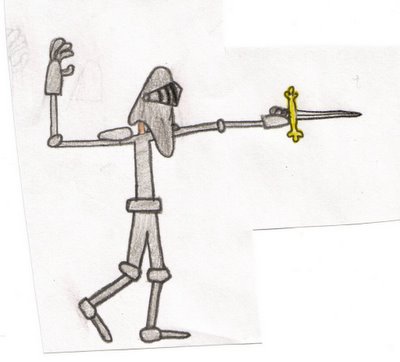W.E.
(from High School, c. 2005)
I could never see how good poetry can be lessened by fun rhyming.
So let me tell you, the pamphlet I found, had just impeccable timing.
For as I removed the twelfth case of periwinkle-lavender bright paint,
I came across a fiercely passionate statement quite quaint.
I had just been searching for a word to rhyme with ‘lurching.’
“To the world,” it said, “the OLD times are dead!
“The search for clever rhyming is like orally mime-ing—
“It doesn’t really exist, though in its search fanatics persist.
“It willn’t be missed; it should be perpetually dissed.
“Rathan* be kissed, it should find a swift fist.
“‘Get the jist!’ I say, as I shake a fierce fist.
“Annoyance is hissed when the word that is to be rhymed is the very same word as the word it is to be rhymed with, and obviously comes from a rhyming dictionary or phonetic sounds list.
“Cease the coercing and endless rehearsing
“Mimes are not amusing, and I fear to hear THEIR musing.
“The way to write doth harshly spite—I’m letting you all know, just, please, let it be so!—those poets who write completely for show.
“So that is why W.E., the Wrongly-written-poems-finder of Earth, decree,
“That,
“‘Hereby, henceforth, from now on, until W.E. say, forever,
“Whosoever elopes upon ridiculously extrapolated tangents that adulterate the integrity of the original subject matter of the poem being written must his writing utensils hurl away and his dominant hand dissever!’”
I thought, ‘How ironic. Rhyming really is moronic.
‘Why, it is something perverse!’
For I’d then discernèd from W.E. so learnèd,
That poetry is poetry as long as it’s in verse!
But, soft and anon, hearken, W.E. went on
To give me the reason for this plea against treason
The treason of manipulating
By going completely out of the way to ensure that a poem sounds clever just because a line ends with a sound similar to that of the ending sound of the last word of the previous poetic line, exempli gratia, in this case a word that rhymes with manipulating, such as ‘stipulating.’
“This will surely preclude further rhyming so crude,
“So, all ye pretenders, ye false, phonetic benders,
“W.E. [and I] do utterly suppress those with poor poetic finesse,
“And so promote true poetry.
“Start writing poems according to the NEW rules…just let it flow…it doesn’t matter if it makes sense…neither does trigonometry!”
Thus, I’m convinced that the truth W.E. evinced.
So, I, the undersigner, of bad poetry am another underminer!
Beware and take heed, ye writers false indeed!
And be not hypocriticizers!
For I, myself, retain that right and claim my place as a citizen in the world of literary rectifiers!
* rathan=contraction of “rather + than”
I could never see how good poetry can be lessened by fun rhyming.
So let me tell you, the pamphlet I found, had just impeccable timing.
For as I removed the twelfth case of periwinkle-lavender bright paint,
I came across a fiercely passionate statement quite quaint.
I had just been searching for a word to rhyme with ‘lurching.’
“To the world,” it said, “the OLD times are dead!
“The search for clever rhyming is like orally mime-ing—
“It doesn’t really exist, though in its search fanatics persist.
“It willn’t be missed; it should be perpetually dissed.
“Rathan* be kissed, it should find a swift fist.
“‘Get the jist!’ I say, as I shake a fierce fist.
“Annoyance is hissed when the word that is to be rhymed is the very same word as the word it is to be rhymed with, and obviously comes from a rhyming dictionary or phonetic sounds list.
“Cease the coercing and endless rehearsing
“Mimes are not amusing, and I fear to hear THEIR musing.
“The way to write doth harshly spite—I’m letting you all know, just, please, let it be so!—those poets who write completely for show.
“So that is why W.E., the Wrongly-written-poems-finder of Earth, decree,
“That,
“‘Hereby, henceforth, from now on, until W.E. say, forever,
“Whosoever elopes upon ridiculously extrapolated tangents that adulterate the integrity of the original subject matter of the poem being written must his writing utensils hurl away and his dominant hand dissever!’”
I thought, ‘How ironic. Rhyming really is moronic.
‘Why, it is something perverse!’
For I’d then discernèd from W.E. so learnèd,
That poetry is poetry as long as it’s in verse!
But, soft and anon, hearken, W.E. went on
To give me the reason for this plea against treason
The treason of manipulating
By going completely out of the way to ensure that a poem sounds clever just because a line ends with a sound similar to that of the ending sound of the last word of the previous poetic line, exempli gratia, in this case a word that rhymes with manipulating, such as ‘stipulating.’
“This will surely preclude further rhyming so crude,
“So, all ye pretenders, ye false, phonetic benders,
“W.E. [and I] do utterly suppress those with poor poetic finesse,
“And so promote true poetry.
“Start writing poems according to the NEW rules…just let it flow…it doesn’t matter if it makes sense…neither does trigonometry!”
Thus, I’m convinced that the truth W.E. evinced.
So, I, the undersigner, of bad poetry am another underminer!
Beware and take heed, ye writers false indeed!
And be not hypocriticizers!
For I, myself, retain that right and claim my place as a citizen in the world of literary rectifiers!
* rathan=contraction of “rather + than”




